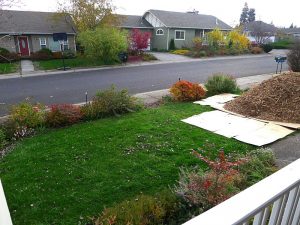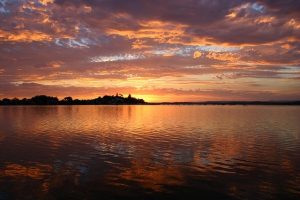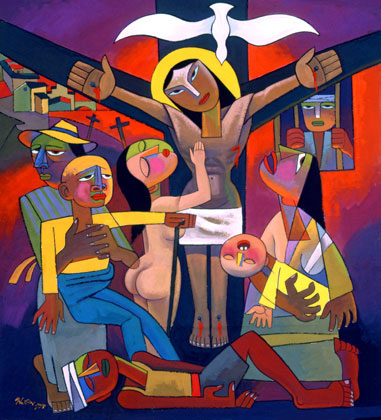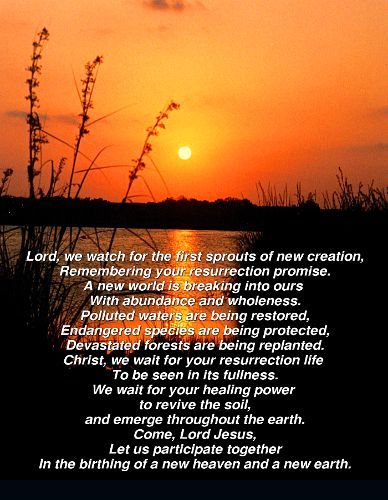This resources is out of date. Please see our latest resource list.
Last year I separated out the stations of the Cross from other Good Friday resources as I know many churches like to have Stations of the Cross available for people to walk throughout Holy Week. There are thousands out there but I have tried to put together a collection from around the world attempting to highlight some of the challenging issues of our turbulent world that are portrayed and have continued adding to that theme this year. Most of the images are far from the traditional stations of the cross though I have ended the collection with a mimed rendition of Sandi Patty’s Via Dolorosa. If there are other international images you think should be a part of this collection please add them in the comments. I would like to continue to enrich this list each year and there is still enough time before Good Friday for me to update this post. Enjoy!
Lets start with an explanation of the stations of the Cross:
Another excellent article on the development of the Stations of the Cross
From Australia
From New Zealand
This series comes from Hamilton New Zealand
Cityside Baptist church in Auckland New Zealand has held an exhibit of contemporary icons to reflect on at Easter for a number of years. The photos shown were taken at their 2002 and 2004 presentations.
From Middle East and Sudan –
The Way of the Cross in Jerusalem
I also came across this interesting set of Jordanian stamps which Mansour Mouasher has found depicting the Stations of the Cross.
Rachel Gadsden is a British artist who is exhibited internationally and who works across the mainstream and disability art sectors, presenting cross-cultural visual dialogues that consider the most profound notions of what it is to be human. Her stations of the cross for St Joseph’s Cathedral Abu Dhabi are powerful.
From North America
From Church of Christ the King in Mt Vernon NJ – a contemporary set done in traditional mode.
This series by Gwynth Leech sets the traditional imagery of the Stations of the Cross in the midst of contemporary conflicts. They were commissioned by Saint Paul’s on the Green in Norwalk Connecticut in 2004. It is a heartrending presentation of the stations of the Cross using images of refugees from Iraq and Sudan as spectators and participants.
Im/migration Stations of the Cross by Nanette Sawyer. It’s a series of original art, looking through the lens of immigration/migration. How can the Jesus story teach us about immigration/migration issues, and how can the stories and experiences of immigrants and migrants increase our understanding of the Jesus story? Make sure you leave plenty of time for this one. Read the description and then click each station down the side – it is a very profound experience.
This series by Minnesotan artist Anne Brink is fascinating.
From Hawaii a fascinating series by Jean Charlot
And from Vancouver B.C. this series by Chris Woods
From South America
A very powerful presentation of the stations from the perspective of liberation theology by Adolfo Pérez Esquivel of Argentina
From Asia
I enjoyed meditating on this series by a nun in Bangalore India
And another very beautiful, Korean Stations of the Cross by Korean sculptor Choi Jong-tae from Myeong-dong Cathedral.
From Africa
I love this stations of the cross from Hekima College, Nairobi, Kenya. The designs were created by Father Angelbert M. Vang SJ from Yaoude, from the Cameroon who was a well-known historian, poet, musician and designer and executed by a Kenyan artist.
This meditation is a poignant reminder of those who struggle daily to carry crosses we cannot even imagine.
From U.K.
This Stations of the Cross series by Chris Gollon was commissioned by the Church of England for the Church of St John on Bethnal Green, in East London. Gollon took the unusual step of using his own son as the model for Jesus, his daughter as Mary, and his wife as Veronica. Fr Alan Green is cast as Nicodemus, and David Tregunna (Gollon’s friend and agent) as Joseph of Arimathea. The juxtaposition of real figures with imagined ones creates a heightened sense of reality. I think that the images are both compelling and powerful.
This series by David O’Connell hangs in St Richards Chichester is another powerful series.
Another series by Linda Sallnow in London
From Europe
The Stations of the Cross by Karel Stadnik, 1973-5, Church of the Virgin Mary in Lhotka, Prague. This is a unique interpretation of the stations in which the a synthetic resin sculpter at each station depicts a different episode of human suffering. The traditional titles of the stations are what helps the observer to make the connection with the life of Christ. According to the web site, “The work was the idea of the local priest Vladimir Rudolf, during the difficult period after Soviet tanks had crushed the “Prague Spring”.”
For kids:
Here is a helpful colouring booklet of the stations of the Cross for young kids
Multimedia Stations of the Cross from Loyola Press
Stations of the Cross Especially for Children
Virtual stations online:
An excellent online video presentation from Jeruslaem.com I have not watched all of it yet but enjoyed what I watched.
And from Busted Halo an excellent set of virtual stations of the cross. These stations relate to Jesus’ teachings about the Kingdom of God and the reason his vision of this Kingdom led to his death. Find a quiet place to watch these stations, and as you do the devotions be open to how God is speaking to you through the Stations of the Cross.
Here is the first meditation
And from Jonny Baker in England a great idea – QR Stations of the Cross
From the Netherlands: I found this mimed rendition of Sandy Patti’s Via Dolorosa very refreshing.
This is part of this series on Resources for Holy Week. Here are all the posts:
Resources for Maundy Thursday:
Our focus for this last week has been on creation and so I wanted to end with this lenten prayer card which speaks to the longing in all our hearts for the restoration of God’s created world.
Today’s Lenten prayers are by my friend John Birch who writes beautiful contemporary Celtic prayers and liturgies which are available through his website: Faith and Worship.
Make me a tree, Lord
Sturdy
Deep rooted
Useful.
Support
To those in need,
Shelter
To those who are weary,
Fruit
For those who hunger.
Make me a tree, Lord
Sturdy
Deep rooted
Useful
For the promise of harvest
contained within a seed
we thank you.
For the oak tree
within an acorn,
the bread
within a grain,
the apple
within a pip,
the mystery of nature,
gift wrapped
for us to sow,
we thank you.
For more Celtic prayers on a theme of creation, check out Faith and Worship.
Photo by Andrew Shelley on Unsplash
This page is old, please check out our latest version here.
The research is in, gardening, and interacting with nature is good for our health and well being, especially for that of our kids. Living near nature dramatically impacts our health and interaction with nature decreases the health gap between rich and poor. Contact with nature helps children to develop cognitive, emotional, and behavioral connections to their nearby social and biophysical environments. Nature experiences are important for encouraging imagination and creativity, cognitive and intellectual development, and social relationships. (Read the article) Kids in particular suffer from nature deficit disorder and as I talk about in attention deficit disorder can be alleviated by encouraging kids to spend more time outdoors.
There is also evidence that exposure to soil bacteria could improve our health by boosting our immune system. And believe it or not even Sniffing Compost Makes You Happy – Literally
Other studies suggest that just looking at nature can improve our health and reduce the time it takes us to recover from surgery. So imagine what a difference a whole afternoon outside can do.
Getting our kids involved in the garden can have even more benefits. In her article Go Outside and Play: Four Reasons Why Exposure to Nature is Essential To a Child’s Wellbeing, Suzy DeYoung talks about the amazing health benefits of getting kids outside. According to the EPA indoor air pollution is the US’s number one environmental health concern. They encourage kids to get outside and play but I think that working in the garden can be even more beneficial.
So lets get our kids outside. Here are some resources to help:
From organic gardening:
From Permaculture Research institute – a great series of articles on gardening with kids
Getting kids into the garden – creating a butterfly garden
Great curriculum for children and gardening from Presbyterian Church
From National Gardening association
From Container gardening for kids
From Gardening Gallery
And in case you missed it here is a general gardening and spirituality resource list
Here in the Pacific NW, it is time to get out into the garden and start planning, planting and enjoying. Not surprisingly I am deep into every catalogue and new book I can find on gardening. And this year there are lots of them because every man and his dog seems to have joined the community garden frenzy. I am delighted to see new gardens springing up all over and new resources constantly becoming available so I thought that it was time to expand and update the list.
I am also getting ready for our annual Spirituality and Gardening seminar. The increasing popularity of this topic makes me realize how much others crave the same kind of connections between their faith and the world around them. As I always say in these seminars: In the Bible I read about the death and resurrection of Christ, in the garden I experience it. In the Bible I read about the abundance of God’s provision, in the garden I experience. The story of God is constantly being lived out God’s world, affirming who God is and who God intends us to be.
Like me many urban dwellers have discovered the joys of vegetable gardening in the last few years and in the process have grown in their intimacy with God. Hopefully, they start small and then as their taste buds explode with the delight of vegetables straight from the garden something strange happens and they become obsessive about converting their lawn into edible vegetation. There is nothing quite like the wonderful sweet flavour of tomatoes picked straight from the vine or of corn that has gone straight from plant to the pot. And to experience the delight of leeks and carrots that have been dragged out of the frosty ground is out of this world.
Why has it taken us so long to discover what people in most other parts of the world have always known – store bought food just doesn’t taste real even when it is organic and “picked from the vine”. Even a friend of ours who is a well known celebrity chef has just discovered in his 70s that food grown in your own backyard is better than any restaurant gourmet meal.
There are many other benefits to growing your own food too. Working in the garden gets us outside into God’s good creation. As I mentioned in a previous post on nature deficit disorder, I don’t think that we realize the consequences to our health – both physical and spiritual of lives that are spent inside under artificial light. Insomina, depression, and of course obesity are all linked to sedentary indoor lives.
This is a much more complete list than I posted last year and adds a few not included in our best selling resource To Garden with God. If there are other resources you would recommend please add them as comments below .
Resources for Creating a Faith Based Community Garden
Here in Seattle we have a number of amazing resources available that are applicable to other parts of the U.S and even around the world.
Seattle Public Utilities Natural Lawn and Garden Care provides a variety of downloadable resources including:
Seattle Tilth is a must contact organization.
- Their educational classes are superb.
- if you are wanting to start a garden the Just Garden project in Seattle is the place to begin,
- The garden hotline is also there to answer your questions.
Montgomery Victory Gardens: Tips for Starting a Faith Based Community Garden
American Community Gardening Association has great advice on community garden basics.
The University of Missouri has an excellent resource Community Gardening Toolkit
North Carolina State University Community Gardens has another excellent resource: Eat Smart, Move More North Carolina: Growing Communities Through Gardens
From Union of British Columbia Municipalities Dig it – A Practical Toolkit for Governments to Support Community Gardens
Garden planning
- Plan Garden – a web based garden planning site
- Gardener’s Supply Kitchen Garden Planning – a great tool for planning a garden based on the square foot garden method
- Mother Earth also has a slightly more sophisticated garden planner.
Organic Gardening
Organic Gardening 101
Organic Gardening advice from Mother Earth
Check out groworganic.com’s you tube channel for a wonderful selection of videos on organic gardening
Share your food
Lettuce links: here in the Pacific NW helps connects those that garden with those who need it.
Ample Harvest helps connect in different parts of the country.
Some of my favourite blogs on food and faith:
- Sparks in the Soil
- Five Loaves Farm
- Sustainable Traditions
- Faith & Food: Biblical Perspectives (United Methodist Church)
- Food and Faith blog (Presbyterian Hunger program)
- I also like this list of 10 great garden blogs
- And a lost from the UK
Some resources from my friends at ARocha Canada
- City of Vancouver has an extensive list of resources, links, etc. for community gardening in B.C..
- City Farmer www.cityfarmer.org: a veritable treasure trove of information on all manner of urban agriculture information
And from Matt Freer in England
- Grow Zones – a community growing resource started by Earth Abbey in the UK, that brings people together locally to help one another grow fruit and vegetables in their own gardens. Participants are supported by the Grow Zones Kit, which is designed to make the prospect of growing fruit and vegetables a less burdensome, more enjoyable prospect and overcome the obstacles to ‘growing your own’.
As well as my own book To Garden with God, you may also find the following books on spirituality and gardening helpful
- Food and Faith: A Theology of Eating by Norman Wirzba
- Planted: A Story of Creation, Calling and Community by Leah Kostamo
- Farming as a spiritual discipline
- The art of the commonplace: The agrarian essays of Wendell Berry
- Craig Goodwin: Year of Plenty
- Brother Victor-Antoine d’Avila-Latourrette, A Monastic Year: reflections From Monastery
- Vigen Guroian: Inheriting Paradise: Meditations on Gardening
- Wendy Johnson: Gardening at the Dragon’s Gate: At Work in the Wild and Cultivated World
- The “Spirituality and Practice” website also has a list of resources (including books, DVDs, poetry, and quotes) on spirituality and gardening.
- There is also a great list of books on food and faith from our friends at Hearts and Minds books. including my favorites: Making Peace with the Land: God’s Call to Reconcile with Creation by Fred Banson and Norman Wirzba and A Year of Plenty by Craig Goodwin
Resources-Curricula for Churches / Faith communities
- Just Eating? (Presbyterian Church USA curriculum for middle schoolers and adults)
- Congregational Tool Kit – Land Stewardship Project . This kit contains videos, resource materials and activities for small and large group gatherings with a focus on building healthy communities by linking people with their food, the land and each other.
- Let’s Move Faith and Communities launched by Michelle Obama provides some excellent resources includingthis toolkit which contains good basic information on community gardening
- The US Department of Agriculture also has some helpful resources available including this start up community garden guide
- Master gardener programs which exist throughout US and Canada are a great resource for volunteers, advice and expertise. I heartily recommend contacting your local branch to see if there is a volunteer who might assist your garden’s development.
- Harry Wyman from the Peace Tree Community in Perth has started a global permaculture network. I love the concept of permaculture and hope that we will be able to implement many of its principles in our garden at the Mustard Seed Village
- Territorial seeds
- Peaceful Valley
- Seed Saver Exchange
- Real Farmacy also has a list of 131 Heirloom Seed Companies by Region that is really helpful.
- My article Which Seed Companies Can You Trust documents why some that I once loved are no longer on this list.
– Andy Wade –
Some of you have been following the developments in our family’s backyard garden. Transforming our backyard from grass to sanctuary has enriched our table as well as our souls. It’s a place of quiet, of reflection, of prayer, and where God can teach us about the intricate patterns and relationships in creation and how we fit into the larger purposes of God in the world.
One of Christine’s suggestions for Lent was to create an indoor Lenten garden to help us focus and reflect during this season. I was all excited about this and then realized that I had already started a Lenten garden in our front yard!
 Like most yards in our neighborhood, we have a public sidewalk in front with either grass or a garden bed with shrubs marking the line of our property. It’s quite clear what’s “mine” and what’s public. People walk their dogs through the neighborhood but know it’s a “no, no” to let your dog do its business in the middle of someone’s property. We walk by and admire what each other has done, but these are not yards to really stop and enjoy. While I’ve yet to see a “Keep off the Grass!” sign in our neighborhood, neither are front yards an invitation to community.
Like most yards in our neighborhood, we have a public sidewalk in front with either grass or a garden bed with shrubs marking the line of our property. It’s quite clear what’s “mine” and what’s public. People walk their dogs through the neighborhood but know it’s a “no, no” to let your dog do its business in the middle of someone’s property. We walk by and admire what each other has done, but these are not yards to really stop and enjoy. While I’ve yet to see a “Keep off the Grass!” sign in our neighborhood, neither are front yards an invitation to community.
I was first stimulated to think about this when I learned about Springwater Community and the “little free libraries” dotting the Lents neighborhood in Portland, Oregon. Here, in front yards, was an invitation to stop…to open a tiny door and either leave or take a book. This simple expression of community, of sharing, really began to open my eyes to front yard possibilities!
The Design
 Last fall we gathered a whole lot of plain cardboard boxes, flattened them out and covered all the grass in the front yard. My folks had just removed a couple of dead trees from their yard and the chips from all the branches provided a nice thick mulch over the cardboard. It sat this way over the winter as I pondered and prayed about what it could become.
Last fall we gathered a whole lot of plain cardboard boxes, flattened them out and covered all the grass in the front yard. My folks had just removed a couple of dead trees from their yard and the chips from all the branches provided a nice thick mulch over the cardboard. It sat this way over the winter as I pondered and prayed about what it could become.
As I began to prepare for Lent, I realized God was challenging me to approach it differently. As I wrote in an earlier post, God was challenging me not to randomly give up some part of my life for Lent but to explore what it would mean to live more fully into the plans and purposes of God every day of the year. This entry into Lent would help reveal things that hinder me from more fully loving God and loving others. It would show me what I need to give up or modify, not for a season, but as a lifestyle change to be more available to walk into the fullness of God’s shalom.
And that’s where my vision for the front yard was transformed. As I sat looking out over the yard, I began to ask questions like:
- What does our front yard reveal about what we value?
- How do front yards create barriers to community?
- As we walk through our neighborhood, what inspires us about other people’s front yards? Why?
- Are there front yards that make us feel excluded or unwelcome? What are the elements that provoke those feelings?
- Are there front yards that feel more inviting? Why?
Refinement
What do we value? Personally, I know I need solitude. our backyard is a place of prayer and deep reflection. Others are welcome there, but usually only by invitation. But I also value community. Over the years I’ve had a lot of opinions about what community is, or should be. It’s easy to let our opinions run away with me until “community” becomes some collection of people who conform to my standards and ideals. But that’s not community.
Community comes to us on a multitude of terms. My involvement helps shape it, but so does the involvement of each of the others who participate. Community is not my backyard sanctuary where I’ve pre-defined the conditions. Community is often messy, fluid, welcoming of the other right where they are. What would that kind of community look like in my front yard?
Inviting
We began exploring what it would look like to have an inviting space. We don’t want this to be a space people feel they must be personally invited into, we want this to be a place that draws people in. A space that says “Welcome”. Whether we are in the front yard or not, we want people to feel this is a place of rest, of quiet conversation, reflection, and community.
Although we have only 40 feet of front yard garden space, we created two paths from the sidewalk into the garden. The paths fan out at the sidewalk, a kind of visual invitation to venture in. Paths radiate in waves like rays from the sun. Nothing is straight, but flowing and natural. We didn’t want it to feel like a formal garden but a place to casually explore.
Soon we will be adding a bench next to a micro-library along one of the paths – an invitation to come in, to sit, to share. We also have plans to include a you-pick tea garden with a variety of mints, lemon balm, and herbs for the taking. Later we may even add vegetables and flowers to share.
A Grand Experiment
This is really all a grand experiment. We don’t know where it will lead. Already God has touched and challenged us to rethink what it means to love God and love others in the context of our landscape. As we’ve explore what can be done, I’ve found myself more open to how this all applies outside the confines of our own yard. Curious neighbors have stopped by to find out what we’re up to, which has led to some wonderful conversations and new ideas for the space. While talking with our neighbor to the south, we were inspired to purchase together two espalier apple trees to plant on the border between our yards. Soon we’ll be sharing the fruit of friendship!
And really, as I reflect on what God is cultivating in us through this redesign of physical space, I’m realizing that the cultivation and nurture of friendship is not limited to a garden or a yard but is a challenge to each of us whether we live in urban centers, suburbs, or way out in the country. Perhaps the most authentic of Lenten gardens are the ones that break down the barriers between us and them, and mine and yours. And maybe the Lenten garden is simply a metaphor to encourage us to more intentionally cultivate community from the barren soil of alienation and loneliness and to nurture friendship from soils contaminated with fear and suspicion.
What does your Lenten garden look like?
 Related Garden/Food Posts from Andy
Related Garden/Food Posts from Andy
- I am but a worm (parts one and two)
- Cultivating Faith
- Embracing the Imagination of God
- Companions in the Neighborhood
- Intentionally Ordinary – the Water of Life
- Are You a Deadhead?
- Spiritual Lessons from Powdery Mildew
- Spiritual Monocropping
- The Harmful Effects of Processed Spirituality
- To Everything… There is a Season
- Food, Faith, and God’s Good Creation
- Listening in the Garden and Learning from God
- Gangster Gardening
- The Spirituality of Scarcity and Abundance – Part one – Part two
Today’s Lenten prayer is one I wrote a couple of years ago when Good Friday and Earth Day coincided. It reminds me of God’s concern for creation and the love of creation that is expressed in the Bible. And as I think about the devastated lives from the mudslides here in the Pacific NW it is also a reminder of how broken God’s creation is too.

God all of created life is groaning waiting for the future God has prepared for us,
We hope for the day on which all you have made will be rescued from death and decay,
We wait for the redemption of our bodies and the restoration of our world.
In my opinion whatever we may have to go through now is less than nothing compared with the magnificent future God has planned for us. The whole creation is on tiptoe to see the wonderful sight of the sons of God coming into their own. The world of creation cannot as yet see reality, not because it chooses to be blind, but because in God’s purpose it has been so limited – yet it has been given hope. And the hope is that in the end the whole of created life will be rescued from the tyranny of change and decay, and have its share in that magnificent liberty which can only belong to the children of God!
It is plain to anyone with eyes to see that at the present time all created life groans in a sort of universal travail. And it is plain, too, that we who have a foretaste of the Spirit are in a state of painful tension, while we wait for that redemption of our bodies which will mean that at last we have realised our full sonship in him. We were saved by this hope, but in our moments of impatience let us remember that hope always means waiting for something that we haven’t yet got. But if we hope for something we cannot see, then we must settle down to wait for it in patience. (Romans 8:18 – 25 (Phillips Translation)
God in this season of hope and promise bless the earth rich and fertile with life
God in this season of planting and growth, bless the seed we plant and nurture
As it falls into the ground to grow may we remember your body broken for us
Unless a seed is planted in the soil and dies it remains alone
But its death will produce many new seeds,
a plentiful harvest of new lives (Jn 12:24 NLT)
God as we sprinkle our gardens with the water that gives life,
May we remember lands that are parched and those that are flooded
May we remember Christ that your life blood was poured out for us,
You were hung upon a tree and crucified
So that together with all your creation we might be liberated into freedom
Open up O heavens and pour out your righteousness
Let the earth open wide
So salvation and righteousness can sprout up together (Is 45:8 NLT)
As we watch for the first sprouts of new creation
We remember your resurrection promise,
A new world is breaking into ours with abundance and wholeness
Look I am making all things new…
On each side of the river grew a tree of life
Bearing twelve crops of fruit with a fresh crop each month
The leaves were used for medicine to heal the nations (Rev 21:5; 22:2 NLT)
Christ we wait for your resurrection life to be seen in its fullness
May your healing be revealed in our bodies
May your healing power be seen throughout the earth
May we all participate together in the coming of a new heaven and a new earth
As an Amazon Associate, I receive a small amount for purchases made through appropriate links.
Thank you for supporting Godspace in this way.
When referencing or quoting Godspace Light, please be sure to include the Author (Christine Sine unless otherwise noted), the Title of the article or resource, the Source link where appropriate, and ©Godspacelight.com. Thank you!





